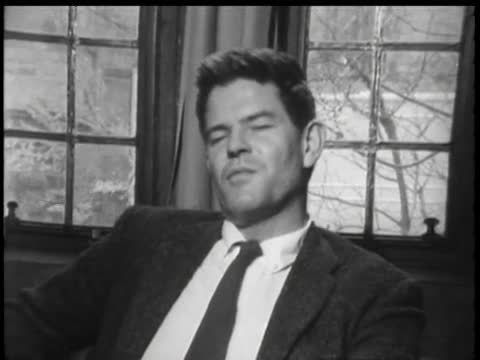Radical Americans; 2; What's New on the Left
- Series
- Radical Americans
- Episode Number
- 2
- Episode
- What's New on the Left
- Producing Organization
- WGBH Educational Foundation
- Contributing Organization
- Library of Congress (Washington, District of Columbia)
- AAPB ID
- cpb-aacip-512-jh3cz33457
- NOLA Code
- RADA
If you have more information about this item than what is given here, or if you have concerns about this record, we want to know! Contact us, indicating the AAPB ID (cpb-aacip-512-jh3cz33457).
- Description
- Episode Description
- The so-called New Left has all but dominated page one of the nation's newspapers for the past few years. Its members lie down in front of troop trains, collect blood to give to the North Vietnamese, maintain that this country is run by a power structure of big business, and a few national politicians. They constitute the more militant of the civil rights groups. And yet, these groups, generally young and often students or just out of college, are in a strong tradition of radicalism in this country, the most notable examples of which are Thoreau and the abolitionists. The episode draws a distinction between the young radicals in this tradition and the dogmatic communist radicals of the Communist Party USA or Progressive Labor, the so-called pot left. Interviewed are Gus Hall, general secretary, Communist Party USA; Milt Rosen, co-founder, Progressive Labor; Bill Epton, Progressive Labor Party candidate for the New York Legislature, recently convicted on a charge of criminal anarchy against the state and now in prison; Staughton Lynd, professor at Yale, philosopher of the New Left, whose trip to Hanoi has created an international incident; Michael Harrington, director of the League for Industrial Democracy; Julian Bond of the Student Non-Violent Coordinating Committee, who was elected to the Georgia Legislature and was refused a seat by the Legislators. (Description adapted from documents in the NET Microfiche)
- Series Description
- The growing wave of radical movements in the United States today both on the left and the right are examined in first-hand, on-location reports, interviews, coverage, and commentary throughout a cross-section of the country. The Radical Americans explores the underlying concern of both poles the threat to individual freedom. What the left and right wing radicals have to offer as solutions, the means they use to proselytize their views, the real motivations and historical impact of their power are probed in the series. Camera crews traveled throughout the US documenting campuses, ghettos, towns, cities, in meetings, the views and actions of well-known and obscure citizens and groups involved directly and indirectly with radical movements. The gamut of spokesmen includes politicians, historians, Communists, Black Muslims, members of the John Birch Society, ultra conservative and liberal professors, writers, and civil rights leaders. In documenting coverage, the production crews of The Radical Americans at times were met with resentment, fear, and opposition by people in places chosen for the series report. The Radical Americans is a 1966 production of National Educational Television and WGBH, Bostons educational television station. The 6 episodes that comprise this series each run about 30 minutes. (Description adapted from documents in the NET Microfiche)
- Broadcast Date
- 1966-04-13
- Asset type
- Episode
- Rights
- Published Work: This work was offered for sale and/or rent in 1972.
- Media type
- Moving Image
- Duration
- 00:30:00
- Credits
-
-
Associate Producer: Bywaters, Thomas
Interviewee: Harrington, Michael
Interviewee: Lynd, Staughton
Interviewee: Bond, Julian
Interviewee: Rosen, Milt
Interviewee: Epton, Bill
Interviewee: Hall, Gus
Producer: Fouser, Don
Producing Organization: WGBH Educational Foundation
Reporter: Fouser, Donald
Writer: Fouser, Don
- AAPB Contributor Holdings
-
Indiana University Libraries Moving Image Archive
Identifier: cpb-aacip-5d5ed8a4ad5 (Filename)
Format: 16mm film
-
Library of Congress
Identifier: cpb-aacip-048656868a6 (Filename)
Format: 1 inch videotape: SMPTE Type C
Generation: Master
Color: B&W
-
Library of Congress
Identifier: cpb-aacip-96f122166d4 (Filename)
Format: U-matic
Generation: Copy: Access
Color: B&W
-
Library of Congress
Identifier: cpb-aacip-80b1649980f (Filename)
Format: 2 inch videotape
Generation: Master
Color: B&W
-
Identifier: cpb-aacip-9a22675ceca (unknown)
Format: video/mp4
Generation: Proxy
Duration: 00:30:00
If you have a copy of this asset and would like us to add it to our catalog, please contact us.
- Citations
- Chicago: “Radical Americans; 2; What's New on the Left,” 1966-04-13, Library of Congress, American Archive of Public Broadcasting (GBH and the Library of Congress), Boston, MA and Washington, DC, accessed February 28, 2026, http://americanarchive.org/catalog/cpb-aacip-512-jh3cz33457.
- MLA: “Radical Americans; 2; What's New on the Left.” 1966-04-13. Library of Congress, American Archive of Public Broadcasting (GBH and the Library of Congress), Boston, MA and Washington, DC. Web. February 28, 2026. <http://americanarchive.org/catalog/cpb-aacip-512-jh3cz33457>.
- APA: Radical Americans; 2; What's New on the Left. Boston, MA: Library of Congress, American Archive of Public Broadcasting (GBH and the Library of Congress), Boston, MA and Washington, DC. Retrieved from http://americanarchive.org/catalog/cpb-aacip-512-jh3cz33457
